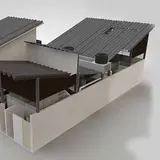NXTHVN Video Tour
Executive Director Nico Wheadon gives a tour of NXTHVN, a new art space developed by artist Titus Kaphar and partners in Dixwell, New Haven, as it stood in July of 2019.
Titus Kaphar and fellow Yale School of Art graduate Jonathan Brand had moved back to New Haven from New York in search of affordable studio space. That need blossomed into a vision for an arts incubator in the Dixwell neighborhood. Though the original model was a for-profit venture, the project’s new partner, financier Jason Price, pointed out the benefits of moving to a primarily nonprofit model. Potential investors might not be attracted by the expected financial return, he argued, but a philanthropic appeal could generate funds based on the project’s social return. This approach could widen the project’s scope and connect it with other community organizations working to revitalize Dixwell’s cultural and economic life.
But the first step was to find a suitable building. Kaphar had considered a small, abandoned factory on Henry Street dozens of times, but had been unable to get in touch with the owner. One day in 2016, he finally reached the owner and convinced him to sell.
From the case:
169 Henry Street stood out as having a particularly negative reputation, known for the illegal activity that had long gone on inside. Only after New Haven’s anti-blight taskforce, the Livable City Initiative, had cleared the building and revealed the sheer scale of the space could Kaphar and fellow founders see the possibilities for the location. With the help of the city and state grants and private donations, they purchased the abandoned property for $260,000.
The abandoned factory’s prime location in the center of Dixwell, coupled with its renovation potential and Kaphar's desire to celebrate the innovative spirit of the neighborhood, led him to realize this abandoned building could be something big. "This is not starting from scratch," he said. "This is actually building on the foundation that something exists. This is adaptive reuse."
Through contacts Kaphar had made earlier, the project engaged a leading architect, Deborah Berke, head of a New York design firm and dean of the Yale School of Architecture. Berke saw that the vision of the property could expand, allowing the property to provide space for Kaphar's vision of a space that would provide greater benefits to the neighborhood and connect the artists to the larger community.
- From Yale School of Management Case Study #19-017, “NXTHVN”




